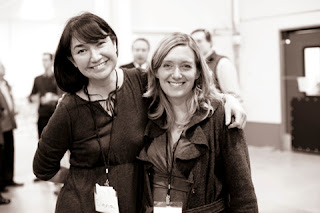Vermont is Taking Big Steps in Cultivating Happiness!! (part 1)
by Heather DavisHappiness. What does it really look like? How do we achieve it? How do we measure it? Where does responsibility lie in achieving this state? With us as individuals? With the state to support policies that will enhance happiness and well-being? Or both? These are the questions that Vermonters are now asking themselves due to a new law passed this year, S.237, which calls for the State of Vermont to measure the well-being of its citizens. The indicators and the associated data that are being developed for this state initiative will be a real asset in decision-making; for the state budget, for local businesses and organizations, in creating laws and policy, and for individuals in making decisions about their own lives. This is exciting and progressive stuff!
On May 30th, I spent the day at the University of
Vermont attending the Measuring What
Matters: Pathways to Sustainable Well-Being in Vermont conference,
sponsored by the Gund Institute for
Ecological Economics, Gross National
Happiness USA, and Common Good Vermont. I am a data geek and I love measures, so the
idea of measuring our well-being in a way that is more representative and
accurate than the traditional Gross Domestic Product (GDP) method really
appeals to me. Monitoring progress
toward goals is the only way we can really know if we are really making our way
toward those goals – and what a more worthwhile goal than happiness! This conference was really up my alley!
After coming up with the definition of happiness and well-being, the next step will be to develop ways to measure these things. This can be the more difficult part of the process: it’s very important to find the right measures (indicators) – if you measure the wrong thing, you’ll get misleading results and/or the information will not be useful at all. This problem can be seen in the over-emphasis of measuring GDP. The U.S. and other countries have generally focused on this measure – which describes the total sum of all economic activity – and have used it to tell us how “well” a nation is doing. This approach is very problematic for many reasons – not the least of which is that our well-being goes far beyond economics. Yes, economics is an important part of well-being – to a point – but there are many more factors that we need to pay attention to, such as those mentioned above. If one of these factors is languishing we need to do something to address it – both as individuals and collectively as a community, state, or nation. This is why measuring the elements that contribute to happiness is so important – “What you measure affects what you do. If you don’t measure the right thing, you don’t do the right thing” -Nobel Prize winner, Joseph Stiglitz.
The idea of measuring well-being, beyond the traditional and problematic measure of GDP, began in Bhutan in 1972 when the new young king, Jigme Singye Wangchuck, declared that his country would be measuring the Gross National Happiness of his people, which was a more well-rounded way to measure well-being. It has taken some time (Bhutan was way ahead of the curve here), but the idea has caught on in recent years and several other countries, states, the UN have now begun the process of measuring well-being in a more holistic way.




Great job Heather!
ReplyDelete